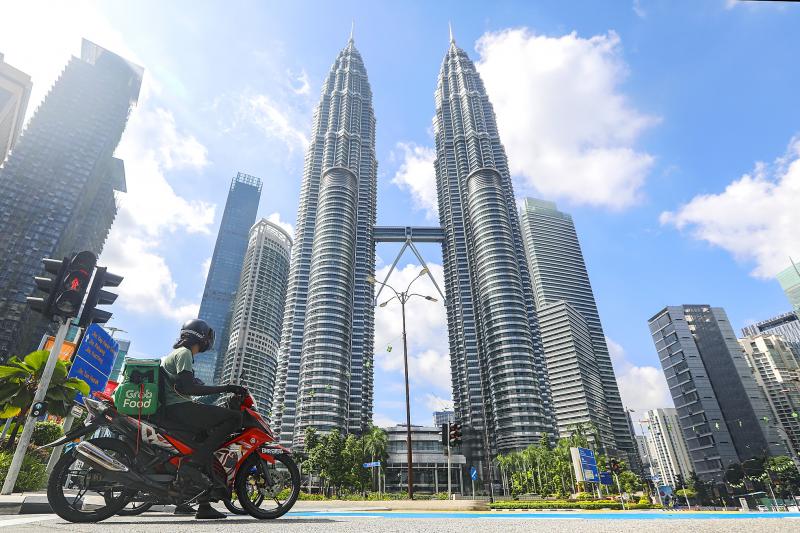Malls and many businesses in Malaysia shuttered yesterday as the country began its second nationwide lockdown to tackle a COVID-19 outbreak.
The nation imposed a partial lockdown on May 12, banning all social activities, but allowing the economic sector to operate.
Malaysian Prime Minister Muhyiddin Yassin announced a large-scale lockdown after daily infections on Friday last week breached 8,000 and reached a record 9,020 on Saturday.

Photo: EPA-EFE
“If this drastic action is not taken immediately, it is feared that our healthcare system will collapse and we will face a bigger catastrophe,” Muhyiddin said in a national broadcast on Monday.
This will be the country’s second nationwide lockdown since the start of the pandemic and it risks derailing its economic recovery.
To help cushion the fallout from the new lockdown, Muhyiddin announced a new 40 billion ringgit (US$9.7 billion) stimulus package.
Businesses are to be closed for two weeks until June 14, except for those in 17 essential sectors, including banking, media, and food and beverage.
More than a dozen manufacturing sectors are also allowed to operate at 60 percent capacity, including the electrical, electronics, and oil and gas sectors.
The plantation, agriculture, fishery and critical construction sectors are also exempted.
Schools have already moved to online classes and inter-district travel has been banned since early last month.
Restaurants can stay open for pick-up and delivery services.
Only two in a household can travel to buy necessities within a 10km radius and three for medical reasons.
Residents can jog in their neighborhood, but no cycling is allowed.
In Kuala Lumpur, police were checking vehicles that entered the city.
About 800 roadblocks have been set up nationwide, especially near fringes of towns where compliance is low.
Although there is no curfew, nearly all businesses allowed to remain open must shut by 8pm.
Infections in Malaysia have climbed since many people breached safety rules to return to their hometowns for Eid al-Fitr.
Daily cases crossed 6,000 on May 19 for the first time and topped 9,000 within 10 days.
Malaysia’s tally has surged five-fold since last year to 572,357 infections since the pandemic began and 2,796 deaths.
Although daily infections slid to the 6,000 range since Sunday, Malaysian Director-General of Health Noor Hisham Abdullah has said that the country is “not out of the woods,” as more infectious variants are present in nearly every state.
With intensive care wards nearing maximum capacity, the Malaysian Ministry of Health has warned that doctors might eventually have to allot beds to COVID-19 patients with a better potential to recover.
The military has set up field hospitals in some areas and several government hospitals are using shipping containers to store bodies as fatality climb.
The government is ramping up its vaccination campaign by setting up mass vaccination centers, as well as allowing drive-throughs and the use of mobile trucks in some places.
Hundreds of private clinics and hospitals are also authorized to provide vaccinations, while businesses have taken the initiative to speed up inoculations for their staff.

FRAUD ALLEGED: The leader of an opposition alliance made allegations of electoral irregularities and called for a protest in Tirana as European leaders are to meet Albanian Prime Minister Edi Rama’s Socialist Party scored a large victory in parliamentary elections, securing him his fourth term, official results showed late on Tuesday. The Socialist Party won 52.1 percent of the vote on Sunday compared with 34.2 percent for an alliance of opposition parties led by his main rival Sali Berisha, according to results released by the Albanian Central Election Commission. Diaspora votes have yet to be counted, but according to initial results, Rama was also leading there. According to projections, the Socialist Party could have more lawmakers than in 2021 elections. At the time, it won 74 seats in the

EUROPEAN FUTURE? Albanian Prime Minister Edi Rama says only he could secure EU membership, but challenges remain in dealing with corruption and a brain drain Albanian Prime Minister Edi Rama seeks to win an unprecedented fourth term, pledging to finally take the country into the EU and turn it into a hot tourist destination with some help from the Trump family. The artist-turned-politician has been pitching Albania as a trendy coastal destination, which has helped to drive up tourism arrivals to a record 11 million last year. US President Donald Trump’s son-in-law, Jared Kushner, also joined in the rush, pledging to invest US$1.4 billion to turn a largely deserted island into a luxurious getaway. Rama is expected to win another term after yesterday’s vote. The vote would

CANCER: Jose Mujica earned the moniker ‘world’s poorest president’ for giving away much of his salary and living a simple life on his farm, with his wife and dog Tributes poured in on Tuesday from across Latin America following the death of former Uruguayan president Jose “Pepe” Mujica, an ex-guerrilla fighter revered by the left for his humility and progressive politics. He was 89. Mujica, who spent a dozen years behind bars for revolutionary activity, lost his battle against cancer after announcing in January that the disease had spread and he would stop treatment. “With deep sorrow, we announce the passing of our comrade Pepe Mujica. President, activist, guide and leader. We will miss you greatly, old friend,” Uruguayan President Yamandu Orsi wrote on X. “Pepe, eternal,” a cyclist shouted out minutes later,

Myanmar’s junta chief met Chinese President Xi Jinping (習近平) for the first time since seizing power, state media reported yesterday, the highest-level meeting with a key ally for the internationally sanctioned military leader. Senior General Min Aung Hlaing led a military coup in 2021, overthrowing Myanmar’s brief experiment with democracy and plunging the nation into civil war. In the four years since, his armed forces have battled dozens of ethnic armed groups and rebel militias — some with close links to China — opposed to its rule. The conflict has seen Min Aung Hlaing draw condemnation from rights groups and pursued by the